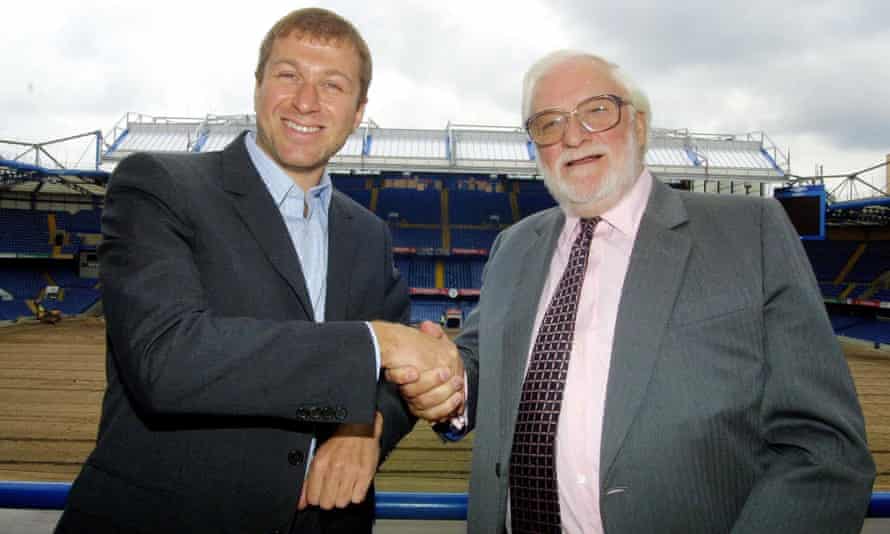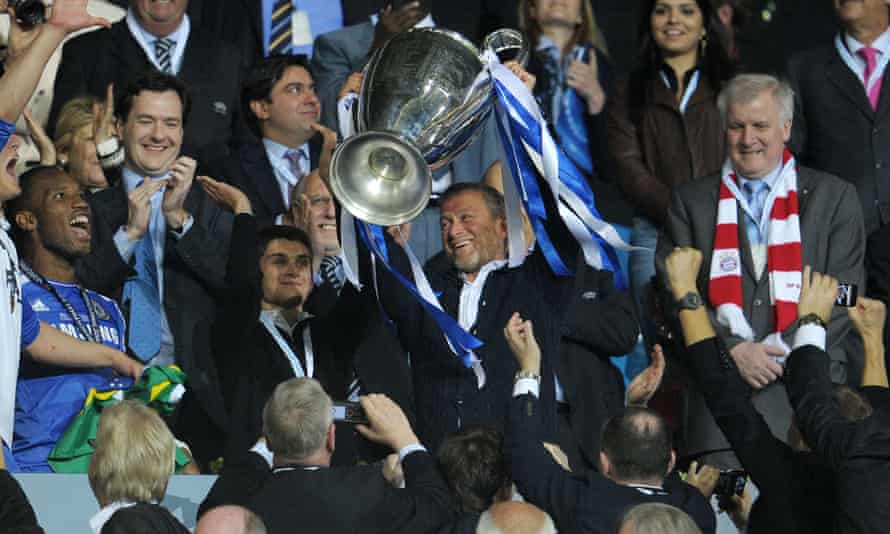Unravelling of Roman Abramovich era leaves doubts at Chelsea and beyond
Stop all the clocks. Stow the faux-fur hats. Delete the Russian folk music from the pre-match playlist. Roman Abramovich is now officially looking for a buyer. Indeed, if we are to believe the reports, Chelsea Football Club could even be sold within the week.
It is an impossibly narrow timeframe for such a complex transaction, made credible only by the fact that, frankly, right now anything seems possible.
Perhaps even, who knows, a little honest reflection on Chelsea’s departing owner, who remains the single most lavish individual investor in the history of European football; but even now a strangely opaque and mysterious year-zero billionaire.
As Abramovich’s benevolent Chelsea dictatorship draws to an end, as even the lavish London houses – no, not the lavish London houses – are rushed to market, all against a backdrop of war, sanctions and the denial of Kremlin ties, perhaps the most extraordinary aspect right now is the memory of those early days when this bashful, oddly sullen-looking suitor emerged blinking into the Stamford Bridge light and began the process of complete and irreversible transformation.
It is 19 years since Abramovich bought Chelsea from Ken Bates for £140m. Looking back now at the late summer sunshine of 2003, it feels like an oddly gauche and guileless world.
In the stands the fans threw mock paper roubles. The newspapers goggled over £200,000 cars, the failed attempt to buy an entire ski resort, the high-end super-divorce. Chelsea spent so much money they had to invent Financial Fair Play. And three years into Vladimir Putin’s version of Russia Abramovich looked at that moment like a vanguard of some new human category, the billionaire uber-lad, with his yacht-flash, his Riviera tan, his endless no-strings spending.

There has certainly been some concern about Abramovich’s motives. In January of this year David Davis MP spoke in the House of Commons about the use of the English legal system to control, as he saw it, the reporting of the activities of wealthy Russians. Davis expressed his views on Abramovich too.
“It is worth reminding people of Mr Abramovich’s background and the character of the man. We are speaking here of the man who manages President Putin’s private economic affairs, according to the Spanish national intelligence committee. This is a man who was refused a Swiss residency permit, due to suspected involvement in money laundering and contacts with criminal organisations. Abramovich was also deemed a danger to public security and a reputational risk to Switzerland.”
A little later Davis added: “When he bought Chelsea FC, Abramovich was the governor of the Chukotka region of Russia. It was alleged by associates of his that the purchase was done at the behest of the Kremlin. As a result of the purchase, he now has enormous soft power and influence in the UK. I ask the House to come to its own conclusion about whether this man is acting at the behest of the Kremlin or Putin’s Government.” It is important to note that Abramovich has vehemently and repeatedly denied having access to, favour with or any special relationship with Putin or the Kremlin. Abramovich also denies that he was motivated in any way by Putin to buy Chelsea FC. He denies that his ownership of the club has anything to do with soft power or political ends.
It is also worth noting that Davis has been an MP for 35 years in the same ruling Conservative party that has overseen the flow of Russian money and Russian influence into the heart of London’s financial industry, legal system and, yes, its politics (the same Conservative party that is funded to a startling degree by donations from Russian-born patrons).
What is most striking here is that, whatever the truth of Davis’s statements, it has still taken this long, to the point where the world has begun to burn, before anyone in a position of power has felt alarmed enough to investigate.
If this is what David Davis thinks, if his colleagues in the House are similarly alarmed, why has no one, from government to the Premier League, felt moved to show some concern for the fate of Chelsea Football Club? Why, given the scenario Davis describes, has this same government refused to apply statutory force to the suggestions for a football regulator? Instead of which Abramovich’s time at Chelsea has coincided with the embrace of an unfettered global market, with an apolitical, ideological amoral approach to club ownership. Don’t ask. Don’t regulate. Just check the bottom line.
This outlook seems increasingly blind to the way big sport works. Football is the popular culture now, Premier League clubs powerful engines for public relations and soft power, so much so that the term sportswashing already seems a little wet and outmoded. If the iconography of Putin and sport tells us anything, if there is any lesson to be gleaned from his use of Fifa and the International Olympic Committee as a global tannoy system, it is that there can be hard edges here, a direction of travel that goes beyond simply promoting the tourist industry.

Two English Premier League clubs are owned by nation state governments, one via a private equity fund run by the crown prince himself. Why do these politicians want to own English sporting clubs? There can surely be no doubt this is, on some level, foreign policy. Saudi Arabia in particular is on a charm offensive, building alliances and establishing itself as a state that no longer needs to have its security guaranteed by the US.
Mohammed bin Salman, chair of Newcastle’s fund, could be seen high-fiving Putin at the G20 summit not so long ago. This is not to impute hostile motives, merely to be aware that a larger game is in train, that football is a part of the surrounding noise, and that clubs are fragile pawns in this stagecraft, the loyalties of supporters and surrounding media piggybacked with surprising ease.
Right up until the point the world moves on. For Chelsea the future looks uncertain. Even if a buyer can be found to act quickly enough, the club has been reliant on the owner’s deep pockets to function at its current level.
The £187m wage bill, the grandiose new stadium plans (now discontinued), the high-priced signings: none of this would have been possible without £1.5bn in personal loans.
The good times will have to roll in some other, more metered fashion from here. That era is now gone, wrenched out at the roots with startling haste.
For the rest of English football, and indeed all sport, there is a lesson to be learned in its unravelling.
Subscribe To Our Newsletter
-
How to get a free jersey
- How to get Pcs free jerseys Feedback Customer Reviews About Us Contact Us News FAQ
-
User Center
- Forget Password My Orders Tracking Order My Account Register
-
Payment & Shipping
- Customs & Taxes Locations We Ship To Shipping Methods Payment Methods
-
Company Policies
- Return Policy Privacy Policy Terms of Use Infringement Policy

